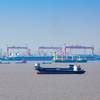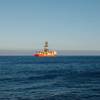Iran has managed to sell only modest volumes of oil to Europe since the lifting of sanctions seven weeks ago and several former buyers are staying away, citing legal complications and Tehran's reluctance to sweeten terms to win back customers.
Tehran had been unable to sell crude to European firms since 2012 when the EU imposed sanctions over its nuclear programme, depriving it of a market that accounted for over a third of its exports and leaving it relying completely on Asian buyers.
Since the restrictions were lifted in January, Iran has sold four tankers - 4 million barrels - to Europe, including to France's Total, Spain's Cepsa and Russia's Litasco, according to Iranian officials and ship-tracking data.
That equates to only around five days' worth of sales at the levels of pre-2012, when European buyers were purchasing as much as 800,000 barrels per day (bpd) from the country
Many former big buyers - including Anglo-Dutch major Shell, Italy's Eni, Greece's Hellenic Petroleum and trading houses Vitol, Glencore and Trafigura - are yet to resume purchases.
A lack of dollar clearing, the absence of an established mechanism for non-dollar sales and the reluctance of banks to provide letters of credit to facilitate trade have been obstacles since sanctions were lifted.
But some former major buyers also cited Tehran's unwillingness to loosen its selling terms from four years ago, and offer flexibility on pricing, despite the world having become oversupplied with oil and Iran's European market share seized by Saudi Arabia, Russia and Iraq.
"Iran is not flexible with terms. They still impose very old-fashioned destination clauses telling you where you can and cannot take your crude," said a senior oil trading executive, who asked not to be named due to the sensitivity of the issue.
"It was okay a decade ago but the world doesn't look like this anymore."
Iran, like top OPEC exporter Saudi Arabia, generally imposes destination clauses that forbid reselling of its crude, to retain control over who receives its supplies, and sets official selling prices for its crude grades every month.
By contrast, Iraq - the world's fastest-growing oil exporter in the past year - allows buyers to resell crude at prices below its official ones.
A spokesman for the state-run National Iranian Oil Company (NIOC) could not be immediately reached for comment.
But its oil export chief Mohsen Ghamsari told Reuters last week that European buyers were cautious about boosting trade immediately because of banking and ship insurance difficulties, and that he expected sales to rise from this month.
He ruled out applying discounts to monthly official selling prices but said he could consider improving the pricing mechanism on some cargoes to attract European buyers.
No Discounts
Before 2012, Iran was exporting around 2 million bpd, with the bulk going to the Asian countries, which retained most rights to buy Iranian oil when the EU imposed sanctions but informally agreed to limit their collective purchases of Iranian crude to around 1.2 million bpd. Tehran has been banned from selling oil to the United States since the 1979 revolution.
NIOC aims to increase exports by 500,000 bpd this year, said Ghamsari. Other than Europe, its main targets for increased sales in Asia are China, India and South Korea, he added.
Iranian oil sales to Asia are estimated to have increased by around 100,000-200,000 bpd in February, after the end of sanctions, which paved the way for Iran to rejoin the global banking transaction network.
The terms being offered to Asian buyers are unchanged since before the lifting of sanctions, but companies in Asia face fewer obstacles than in Europe when buying Iranian oil.
"We looked at options of buying Iranian oil," said another senior executive, from a major trading house in Europe. "We saw that shipping complications made it around $1 per barrel more expensive than rival grades. But when we spoke about discounts - we were told it would not happen."
Olivier Jakob from Petromatrix consultancy said it was possible that Iran did not want to appear "distressed" by offering discounts.
"But maybe it is a sign that unlike Iraq they don't have a massive surplus of oil they need to sell urgently," he added. "When your oil is flowing fast and filling up tanks, you need to get rid of it quickly. So it remains unclear how fast Iran can ramp up output and exports after years of sanctions."
Iran and Saudi Arabia, whose status as the world's top exporter gives it more market clout, are the main oil producers to set their monthly official prices using the BWAVE index.
Iraq and its semi-autonomous region of Kurdistan set prices against dated Brent and Kuwait has also recently switched to dated Brent from BWAVE, citing requests from customers and the need to become more competitive.
Most European buyers say they prefer the dated Brent index to BWAVE, which has proven to be a more expensive option over the past year due to its calculation method.
Russian, Nigerian and Angolan crudes trade at daily changing differentials versus dated Brent, often giving buyers even more flexibility.
Ghamsari said he could consider selling some spot cargoes at dated Brent while sticking with BWAVE for its term contracts. Most buyers say, however, they haven't seen many spot cargoes being offered by Iran so far.
Less Flexible
A third trading source suggested Iran may be waiting until oil prices - hovering at $40 per barrel, near lows seen during the 2008 financial crisis - pick up further before taking steps to regain market share.
"It is a very strange dynamic. As soon as Iran opened up they became less flexible. This is the wrong strategy with too much oil around," said the source.
"You could think the Iranians have no incentive to increase their production while the prices are low. They lived like it for years already - they can cope with another few months."
A source familiar with NIOC's thinking said it would not consider offering discounts to win back market share as it would mean an escalation of a price war and would not benefit Iran or its customers.
All in all, Iran seems to be taking its usual "slow and rather philosophical approach", according to another senior trading source.
"When you ask them: "Why are your prices so bad?", they tell you: "You see - you are asking and that means you are interested."
(By Dmitry Zhdannikov and Alex Lawler; Additional reporting by Rania El Gamal; Writing by Dmitry Zhdannikov; Editing by Pravin Char)













